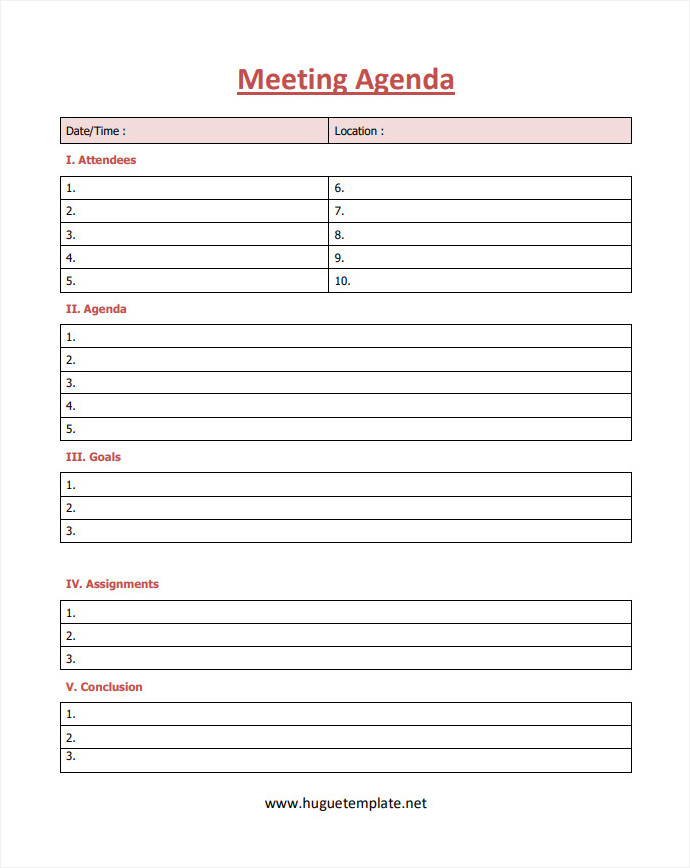Meetings are an essential part of running a successful company. They provide a platform for collaboration, decision-making, and progress. However, without proper organization, meetings can become unproductive and time-consuming. That’s where a meeting agenda template comes in handy.
This article will explore the importance of a meeting agenda, how to create one and provide some examples to help you get started.
What is a Meeting Agenda?
A meeting agenda is a document that outlines the topics to be discussed and the tasks to be accomplished during a meeting. It serves as a roadmap for the meeting, ensuring that all necessary points are covered and allowing participants to come prepared. A well-structured agenda can help keep the discussion focused, prevent tangents, and maximize productivity.
Whether you are leading a team meeting, a board meeting, or a project update meeting, having a clear and concise agenda is crucial. It sets the tone for the meeting, establishes expectations, and helps participants stay on track.

Why Are Meeting Agendas Important?
- Organization: It provides structure and ensures that all relevant topics are covered.
- Time Management: A well-planned agenda helps keep the meeting on track and prevents it from running over time.
- Preparation: Sharing the agenda with participants before the meeting allows them to prepare and contribute effectively.
- Focus: An agenda helps keep the discussion focused on the main objectives and prevents unnecessary tangents.
- Accountability: By assigning tasks and responsibilities to the agenda, participants are held accountable for their actions.
- Documentation: It serves as a record of what was discussed and decided upon during the meeting.
How Do You Write An Agenda For A Meeting?
Follow these steps to create a well-organized and effective agenda:
1. Identify the Purpose of the Meeting
Before creating an agenda, clarify the purpose of the meeting. Is it a brainstorming session, a progress update, or a decision-making meeting? Understanding the objective will help you determine the topics to be discussed and the desired outcomes.
2. Determine the Time and Place
Decide on the date, time, and location of the meeting. Make sure it is convenient for all participants and book a suitable venue if necessary. Include these details at the top of the agenda.
3. List the Topics to be Covered
Identify the key topics that need to be discussed during the meeting. Break them down into smaller subtopics if necessary. Arrange the topics in a logical order to create a flow for the discussion.
4. Allocate Time for Each Topic
Estimate the time needed for each topic and allocate it accordingly. This will help you manage the meeting duration and ensure that all topics are covered within the allocated time.
5. Assign Responsibilities
Assign specific tasks or responsibilities to individuals or teams for each agenda item. This promotes accountability and ensures that everyone is aware of their role in the meeting.
6. Include Relevant Materials
If there are any supporting documents or materials that participants need to review before the meeting, include them as attachments or provide links in the agenda. This will allow participants to come prepared and contribute effectively to the discussion.
7. Review and Share the Agenda
Proofread the agenda to ensure clarity, accuracy, and completeness. Share it with all participants well in advance, giving them enough time to review and prepare. Consider sending a reminder closer to the meeting date to ensure everyone has access to the agenda.
8. Print and Distribute Copies
If you prefer a physical copy of the agenda, print multiple copies and distribute them to each participant before the meeting. This allows everyone to have a reference during the discussion.
Running An Effective Meeting
Running an effective meeting is crucial for the success of any organization. A well-planned and well-executed meeting can lead to better decision-making, increased productivity, and improved team collaboration. However, without proper preparation and organization, meetings can become unproductive and time-consuming.
Here are some key strategies to ensure that your meetings are effective and efficient:
- Set clear objectives: Before scheduling a meeting, clearly define the purpose and objectives. This will help participants understand the importance of the meeting and come prepared.
- Create an agenda: A well-structured agenda is essential for keeping the meeting on track. It should include the topics to be discussed, the time allocated for each agenda item, and the desired outcomes.
- Invite the right participants: Only invite individuals who are directly involved or have a stake in the topics being discussed. This will ensure that the meeting remains focused and productive.
- Prepare and distribute materials in advance: Share relevant documents, reports, and presentations with the participants before the meeting. This allows them to review the information and come prepared with any questions or suggestions.
- Encourage active participation: Create an inclusive environment where everyone feels comfortable expressing their opinions and ideas. Encourage open discussions and brainstorming sessions to foster collaboration and creativity.
- Follow up and track action items: After the meeting, distribute meeting minutes that summarize the key discussion points, decisions made, and action items assigned. Regularly follow up on the progress of these action items to ensure accountability and completion.
Remember to distribute materials in advance, follow up on action items, and continuously improve your meeting processes to make them even more effective. With these strategies in place, you can transform your meetings from time-wasting activities to valuable opportunities for collaboration and decision-making.
Download the Meeting Agenda Template!
Facilitate productive meetings with our printable meeting agenda template! Customizable to fit your meeting objectives, this template provides a structured outline for discussions, action items, and time allocations. With clear sections for topics and attendees, streamline your meeting planning process and ensure all participants stay focused and informed.
Download now to enhance meeting efficiency and achieve your goals effectively.
Meeting Agenda Template – Word | PDF